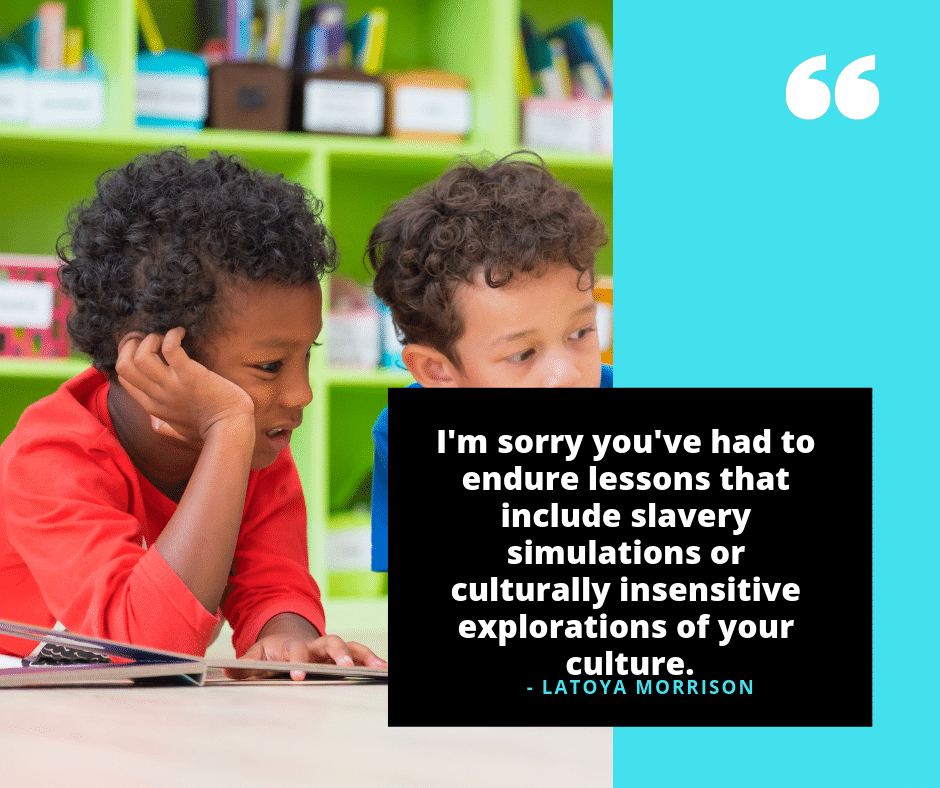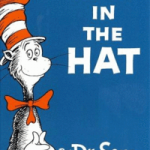Dear Black Students,
I’m tired. I’m tired of sitting in meetings where others discuss you, yet they don’t understand you. I cried for you today. I ache on your behalf because I know you’re tired too. I know you are more than what others think of you. I also know what your journey feels like….and I am so sorry.
- I’m sorry you are viewed as some obscure puzzle that needs to be figured out.
- I’m sorry you are disproportionately disciplined.
- I’m sorry you get kicked out of class for minor infractions.
- I’m sorry some teachers are on edge simply because of your presence.
- I’m sorry you experience loneliness in predominately White spaces because you don’t have allies.
- I’m sorry you don’t see many teachers who look like you.
- I’m sorry assumptions are made about your intelligence.
- I’m sorry assumptions are made about your behavior.
- I’m sorry you’re unable to function with individuality because one student’s behavior becomes a generalization of your behavior.
- I’m sorry you’re grouped into a subpopulation that continues to be viewed as low-performing.
- I’m sorry no one understands the number of microaggressions you face daily.
- I’m sorry the school to prison pipeline was designed with you in mind.
- I’m sorry you feel you have to speak on behalf of Black people when your teachers and peers have questions.
- I’m sorry you have to navigate the uncomfortable spaces of the N-word when read in class literature…when spoken in the hallways of school….at lunch….before school….after school.
- I’m sorry some teachers think less of you.
- I’m sorry some teachers don’t respect you.
- I’m sorry no one hears the culturally insensitive and also racist comments you encounter from peers….and even some teachers.
- I’m sorry not everyone knows the mental trauma you endure trying to navigate the slights and injustices on your campuses and in our society.
- I’m sorry you can’t walk home with your hoodie on your head.
- I’m sorry you can’t hang out, just as your peers do because you will be viewed as a threat while they will be viewed as “just kids.”
- I’m sorry that you’re misdiagnosed and often disproportionately placed in Special Ed programming.
- I’m sorry that you’re over-represented in intervention and remedial courses because of low expectations.
- I’m sorry you’re watched.
- I’m sorry that you have to grow up with constant fear. Fear for your actual life. Fear that others won’t see your gifts or the greatness you can contribute to this society.
- I’m sorry you’re ignored.
- I’m sorry you’re misunderstood.
- I’m sorry some teachers don’t understand how you need to be engaged.
- I’m sorry that your classroom libraries don’t include many diverse texts and/or positive depictions of African-Americans.
- I’m sorry that you don’t learn a balanced history and learn more about the struggle of African-Americans than their triumphs.
- I’m sorry you’ve had to endure lessons that include slavery simulations or culturally insensitive explorations of your culture.
- I’m sorry that some think you’re lazy.
- I’m sorry some teachers/admin don’t recognize how their own biases are impacting your future.
- I’m sorry you’re not recommended for higher-level courses as much as your peers.
- I’m sorry you’re overlooked or disregarded for more challenging work and opportunities.
- I’m sorry you don’t have more advocates and allies along your educational journey.
- I’m sorry you don’t always receive authentic support when you need it.
- I’m sorry that your feelings are hurt and that you act out because you can’t adequately express your frustrations.
- I’m sorry more has not been done to address equity and cultural responsiveness in your schools.
I’m sorry many won’t understand this list and will become defensive instead of empathetic.
Black students…
I see you.
I hear you.
I am you.
I’m not sure if we will ever see a society free from the perils of racism, discrimination, and cultural insensitivity. However, I know that you can prevail. I know it’s exhausting.
I know you wonder why your teachers snap at you, yet have more patience with your other peers.
I know that many don’t see or choose not to see.
I know the times people wanted to touch your hair and pet you (as if you were an animal).
I know the times you silently sighed because you didn’t feel like explaining why your hair is a boundary….one that others are not allowed to cross.
I know the times that you asked for a pencil and were kicked out of class for talking.
I know you see the injustice of seeing other students not reprimanded for worse behavior.
I know it’s frustrating. I know you feel you can’t speak up for yourself because your advocacy is seen as aggression, back talk, or defiance.
I know that you want to be engaged, move, talk, and explore….but your desks are in cemetery rows….or you’re not allowed to express your thoughts because the American standard is to remain quiet.
I know there are times you hunger for a more lively, kinesthetic, atmosphere and that you find your classes or teachers a bore.
I know that you wish you could express how much environment and relationships matter to your learning, but don’t feel you will be understood.
I know how much you yearn to connect with someone during the school day….and you look around and don’t see many who look like you…..or even someone who can relate.
I know that you know the answers to the questions, but don’t respond because you know how your teacher feels about you. You know that less is expected of you….and you’re tired of jumping through hoops to prove that you are GOOD. I know exactly what you mean when you say, “My teacher doesn’t like me.”
I know that you feel unloved.
I know that you feel like a burden to some.
I know that you desire success and regret the times that you chose the label (teachers gave you) instead.
I also know that your other peers of color experience some of the same things you have. I know that it’s equally as exhausting to navigate these territories of microaggressions, together.
[bctt tweet=”I also know that your other peers of color experience some of the same things you have. I know that it’s equally as exhausting to navigate these territories of microaggressions, together.” username=””]I know you don’t even have the words for every moment.
I know it is daunting having to constantly work to prove yourself time and time again.
I know that inside you are brilliant and full of potential.
I can’t promise you that all of these things will change, but I can promise to continue to be your voice when you can’t speak. I can promise to take the risks that you don’t feel you can take. I can promise to stand in the gap. And I will continue even when I’m tired. Even when I cry for you. Even when I ache for your well-being. You will prevail in spite of this broken system…..and when you do…AMPLIFY YOUR VOICE.
P.S.- Dear Teachers,
When you walk into your classroom tomorrow, I hope you SEE your students of color. I hope you HEAR what they are unable to communicate. I hope you take the blinders off. I hope your empathy, understanding, and compassion expands. I hope your curiosity grows and I hope you begin to question inequity, the system, and its dynamics. I hope you become another voice that stands in the gap for ALL kids…..and especially those who are traditionally marginalized. And to those who already know…..let us not grow weary.
Kids need us.
Sincerely,
Your Advocate, Ally, and Activist







Hi Ms. Morrison,
I liked this alot. I’m a white teacher in Moore, Oklahoma. I try to be “culturally responsive” while teaching science. I have things sitting around my room like Native American statues, pictures, posters of people of other races etc. I do talk about scientists of other races and their contributions. Example: We watched Hidden Figures this year which I mainly did because 1. It’s a great movie and 2. Because I have a pretty good number of black female students this year. I let them give a presentation for black history month and told them that I needed to hear the black perspective, not the old white lady perspective. They decorated my door for me also. I had a black history moment every day for a month. I KNOW that this is not enough and yet I am often not sure what I am supposed to do. I feel like I am doing so little. Anyway throw some enlightenment my way. For me, as a white teacher I always wonder when I bring this subject up in my classroom if the students are like:
“Oh here we go again….the white lady telling us what our world is about.” But I feel like its better to try to honor them then ignore the subject. feedback?
Hi, fellow teacher,
I was deeply moved by your post.
I’m a woman,white, and French..but a primary school teacher for all my pupils, no matter their colour and their social or religious background. I’ve spent 10 years teaching pupils aged of10 to 12 in a priority educational area and it took me time to understand the sufferings of my black or arabic pupils.
In France, we don’t have black month, we don’t speak about religion, just because we think that when you don’t speak, everyone will respect the others. We are equal. We teachers, have to be “les hussards noirs de la republique”. It means that we have a laic state, and we respect each other as long as we don’ speak of our differences.
It’s a mistake.plenty of my pupils are ashamed of the language or the culture of their parents. They agree to speak English in class, but refuse to speak the language they use at home.
French black pupils feel the same as in America I think.
Now, when I speak to black pupils of the schoôl, during recess, I try to speak directly to their heart, to their needs. When they are punished at recess, I can see that from their point of view, it ‘s always unfare. Very often, 2 or 3 other black kids come and argue to make me understand that he did nothing wrong, even if it’s not true. They stick together, not like the other kids.
I try to use non violent communication, I connect before I correct.(Marshall Rosenberg)
They are sensitive to my behaviour. These pupils have a very deep sadness in them.And they don’t recognise it. They need the teacher to analyse their feelings, and then they can feel more peacefull.
I think that, as an educator, we need to speak about history, civil rights , feelings and needs with our pupils.
I think your testimony is strong and I won’t forget it when I ‘m back to school.